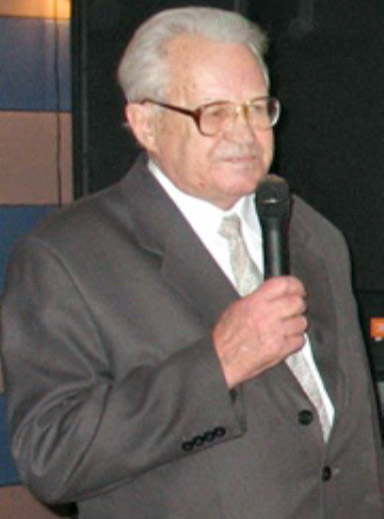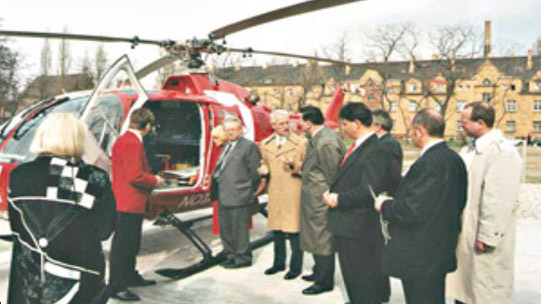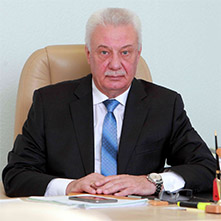History
The 9th City Clinical Hospital was established December 31, 1976. Aleksandr V. Skachko was the first chief physician (December 1976 – March 1996).
On March 11, 1994, Aleksandr V. Skachko was granted the title of the People’s Doctor of Belarus for his contribution in the establishment of the center of bone marrow transplantation.

Education and employment details:
- Aleksandr V. Skachko graduated from Minsk State Medical Instituteж
- for five years he worked as a chief physician at Snov district hospital;
- in February 1963, Aleksandr V. Skachko became a chief physician of Nesvizh district hospital;
- in 1968, he become a deputy chief physician of Minsk Region Department of Healthcare;
- later, he headed Minsk Region Clinic (both for adults and for children);
- in December 1976, Aleksandr I. Skachko was appointed a chief physician of the new 9th Minsk Clinical Hospital.

In 1979, the hospital started operating at full capacity. In 1977, the first hemo- and lymphosorption laboratory was opened in the 9th hospital. The main goal of the laboratory was to cure liver and kidney failure and to perform detoxification. The department of surgical hepatology and hematology were opened. Later, the departments became separate divisions. There were 10 republican centers under the 9th hospital in 1984. From 1992 to 1994, 135 developments were implemented in practice. There was also a data center in the hospital.
Since May 1996 and until retirement Aleksandr V. Skachko chaired the trade union committed of the hospital.
For his prominent work, Dr Skachko was granted the following awards:
- 1971, he was conferred the Order of the Badge of Honour;
- 1974, he was conferred the title of the Honoured Doctor of the BSSR;
- 1978, he was granted the Certificate of the Supreme Soviet of the BSSR
- 1981, he was conferred the Order of the October Revolution;
- 1990, he was conferred the medal of the Veteran of Labour;
- 1994, was conferred the title of the People’s Doctor of the Republic of Belarus.

Vladimir K. Milkamanovich was the chief physician of the hospital from March 1996 to November 1999.
Valery S. Kushnerenko has been working as the chief physician since 1999.
In 2007, Dr Kushnerenko initiated the establishment of the anesthesia and intensive care unit in the admission department of the hospital.
In 2008, the liver and pancreas transplantations were carried out for the first time in the Republic of Belarus in the 9th hospital.
In January 2010, the Republican Research and Practice Center for Organ and Tissue Transplantation and the Organ Transplantation Service were opened under the 9th City Clinical Hospital. Dr Kushnirenko also initiated the establishment of the Republican Center of Hematology and Bone Marrow Transplantation.
In 2013, the Single Republican Register of Organ and Tissue Transplantation was organized.
Dr Kushnirenko participated in the development of a new version of the law “On human organ and tissue transplantation”.
Dr Kushnerenko was granted numerous awards for his diligence and contribution in the field of healthcare in the Republic of Belarus:
- Badge of Excellence in Healthcare (2000);
- Certificate of Appreciation of the National Assembly of the Republic of Belarus (2012);
- Certificate of Appreciation of the State Science and Technology Committee of the Republic of Belarus (2013);
- Certificates of the Ministry of Health of the Republic of Belarus and the Healthcare Committee of Minsk City Executive Committee;
- Medal of Belarusian Orthodox Church of Saint Euphrosyne of Polotsk (2011);
- Order of Belarusian Orthodox Church of Saint Cyril of Turov.
The 9th City Clinical Hospital is a multi-field healthcare provider. The specialists of the hospital provide specialized, urgent and planned care. The hospital has departments of surgery and internal medicine, paraclinical departments, administration office and auxiliary services.
The capacity of the hospital is 1005 beds (as of August 1, 2016), including:
- 519 beds for the therapeutic patients (departments of cardiology, hematology, rheumatology, gastroenterology and pulmonary department);
- 198 beds for the patients with neurological disorders;
- 245 beds for the surgical patients;
- 43 beds in the department of intensive care. The number of beds will increase after reconstruction of the hospital.
In 1993, the Republican Center of Hematology and Bone Marrow Transplantation was established in the 9th City Clinical Hospital. The specialists of the center
- provide care to the patients with cancer and hematologic diseases;
- examine and treat the patients before transplantation;
- carry out courses of immunosuppressive therapy and polychemotherapy (standard-, medium- and high-dose);
- collect bone marrow transplant and peripheral blood stem cells;
- carry out high-dose chemotherapy and radiotherapy in the conditioning regimen before transplantation;
- transplant hematopoietic cells (bone marrow and peripheral blood stem cells);
- carry out complex therapy during the pancytopenic period associated with a previous special treatment.
HLA-typing laboratory is a division of the Hematology Service. The core activity of the laboratory is tissue typing for the purpose of bone marrow and organ transplantation, detection of genetic disorders and diagnosis of certain forms of infertility.
There is the Umbilical cord blood stem cell bank in the Laboratory for separation and freezing of bone marrow. Banking is paid. Collection and storage of umbilical cord blood stem cells is a new medical technology similar to medical insurance, because once collected, stem cells may be preserved for decades. If necessary, the stem cells may be used to treat a range of genetic disorders and acquired diseases. We developed the technology for the collection and long-term storage of cardiac valve allografts, which may be used instead of expensive foreign implants. The newly-established cryopreserved valve allograft bank helped to make cardiac surgery more effective and cheaper.
In 2009, the City register of donors of hematopoietic stem cell office was established. In 2014, it was reorganized into the Central register of hematopoietic stem cell donors.
The key activity of the staff of the Gamma Teletherapy Room is to carry out inpatient and outpatient anti-inflammatory and anticancer radiation therapy.
In 2008, the first liver transplantation in Belarus was made by the specialists of the 9th city hospital.
At the beginning of 2010, the Republican Research and Practice Center for Organ and Tissue Transplantation was established under the 9th City Clinical Hospital. The specialists of the center carry out extended liver resections for benign and malignant tumors, surgery for bile ducts, laparoscopic liver resections and cholecystectomy, pancreatoduodenal resections, surgery for chronic pancreatitis, laparoscopic splenectomy, portosystemic shunting, TIPS placement, minimally invasive surgery, endoscopic sclerotherapy for esophageal varices, transplantation of kidney or liver from a deceased or living related donor, multivisceral transplantation (kidney + pancreas, liver + kidney, intestine) and beta cell xenotransplantation.
The Department of Hepatology and Minimally Invasive Surgery is one of the divisions of the Republican Research and Practice Center for Organ and Tissue Transplantation. The core activities of the department are: diagnosis, consultation, treatment and surgery for the diseases of the liver, bile ducts, pancreas and spleen, as well as for the diseases of other organs and systems, which damage the liver.
In 2013, the Single Transplant Register Department was established with a view to controlling the use of human organs and tissues and to promptly providing medical care to the individuals, who need transplantation.
In March 2010, the Room of Angiography was opened. The patients with severe forms of the coronary artery disease, low-extremity atherosclerotic vascular disease, complex arrhythmias and the patients before and after liver transplantation are provided with medical care in this room.
In 2011, the Department of Cardiac Surgery with the capacity of 25 beds was opened.
There is also the computed tomography room in the hospital.
7 departments of Belarusian State Medical University, departments of Belarusian Medical Academy of Post Graduate Education and the republican centers (see the list below) function under the 9th City Clinical Hospital:
- The Republican Center for Organ and Tissue Transplantation;
- The Republican Center of Hematology and Bone Marrow Transplantation;
- The Republican center of Hemophilia;
- The Republican Center of Rheumatology;
- The Republican Center of Extracorporeal Homeostasis Correction;
- The Republican Center of Nephrology and Renal Replacement Therapy.
In 2009, the new course on transplantation was implemented under the department of cardiac surgery of Belarusian Medical Academy of Post Graduate Education. The clinical trial site is the 9th City Clinical Hospital.
In the hospital, the patients may get a consultation with a hematologist, gastroenterologist, nephrologist, rheumatologist, cardiac surgeon and otolaryngologist. The Interdistrict room of otolaryngology admits the patients of 14 city outpatient clinic (under referrals) and provides 24/7 urgent care to the patients with ENT pathology (to the patients of 19 outpatient clinics).
In 2011, the 9th City Clinical Hospital got accredited as a scientific organization (certificate of accreditation N.10 as of June 30, 2011).
Being a leader in the field of transplantation and hematology, the 9th City Clinical Hospital carries out the following research:
- to develop and use new technologies for the transplantation of the liver, kidney, pancreas, heart, lungs, hematopoietic stem cell and mesenchymal stem cells;
- to develop and use new methods for the diagnosis, surgery, anesthesia and intensive care in the patients with the diseases of the liver, pancreas, kidney and other organs (in combination with endovascular and minimally invasive surgery);
- to develop and use new and more effective treatment protocols for hematopoietic malignancies and hematologic disorders;
- to study the differentiation mechanisms of human stem cells and assess their potential application in transplantation and regenerative medicine.
The hospital includes 5 clinical departments (department of transplantation, department of hepatology and minimally invasive surgery, department of nephrology, renal replacement therapy and kidney transplantation, department of anesthesia and intensive care and the department of cell transplants) and the science department.
The science department consists of:
- immunophenotypic study group;
- molecular and cytogenetic study group;
- cell biotechnology group;
- epidemiological study group for blood diseases.
There is the Coordination Department for the Retrieval of Organs and Tissues in the hospital and the multi-organ retrieval team.
As of January 1, 2016, the staff of the hospital was 1704 medical specialists. 73.7% of the physicians and 75.7% of paramedics have qualification categories. We have 4 MDs and 23 PhDs in Medicine in our team.
113 new diagnostic and treatment methods were developed and implemented in practice in 2011-2015, i.e.
- the comprehensive method for the preparation of liver transplants. The method reduced the incidence of post-transplantation complications and increased the efficacy of organ transplantation in general. In 2015, 445 organ transplantation surgeries were made in Belarus, including 333 kidney transplantations, 72 liver transplantations, 33 heart transplantations, 5 pancreas transplantations and 2 lung transplantations.
- the unique method of treatment for a resistant and recurrent Hodgkin lymphoma. The method is based on a tandem autologous transplantation of hematopoietic stem cells.
- the method of collection and long-term storageof cardiac valve allografts, which may replace expensive foreign implants. The cryopreserved allograft bank was established. As a result, cardiac surgery became more effective and cheaper.
- the unique technology for the collection of mesenchymal stem cells from the human adipose tissue during multi-organ retrieval procedures. The technology was used to develop and register in Belarus a biomedical cell product (Human mesenchymal cells, TS BY 100660677.001-2014). The product is successfully used in therapy for immunological complications caused by organ transplantation and bone marrow transplantation. The mesenchymal stem cell bank was created.
38 guidelines for the use of new medical technologies were prepared and approved.
We developed, registered and got the approval from the Ministry of health of the Republic of Belarus for the production and use of 2 biomedical cell products:
- Human mesenchymal cells TS BY100660677.001-2014;
- Lysed platelet concentrate TS BY 100660677.002-2014.
There are 2 cell and tissue banks in the 9th City Clinical Hospital:
- mesenchymal stem cell bank;
- valve allograft bank (for cardiac surgery).
In 2011-2015, 19 patents of invention were obtained.
One license agreement was made.
Patent of invention No.18199 “Cannula for organ perfusion during expalntation” was sold to Belarusian-German joint venture Fresenius-Borisov-Dializotechnik under the license agreement.
The new methods and technologies are used for the export of medical services. The volume of export in 2011-2015 amounted to 20 mln US dollars.
25 meetings, conferences and symposia, including international ones, were arranged and hold in 2011-2015 at the 9th city clinical hospital. The specialists of the hospital participated in international and republican conferences and delivered 327 reports.
5 monographs, 10 teaching aids and 310 articles were published by the medical specialists of the hospital in 2011-2015.
In 2015, the 9th city clinical hospital founded the international research and practice journal “Hematology. Transfusion. Eastern Europe.”
5 information resources (registers, etc.) were created and approved by the Ministry of Health of the Republic of Belarus:
- single transplantation register;
- republican register of hemopathic epidemiology;
- central register of hematopoietic stem cell donors for the purpose of allogeneic transplantation of hematopoietic stem cells from unrelated donors;
- electronic system for the collection of processing of the data obtained from the republican epidemiological register of the patients with hematological disorders;
- data analytics system “Donor matching for unrelated transplantation” (certificate of state registration No.С-0106-01-2015 as of March 13, 2015).
From 2010 to 2015, the medical specialists of the 9th City Clinical Hospital participated in 12 international projects for transplantation, hematopoietic malignancies, anesthesia and intensive care.
The specialists of the hospital provide free urgent and planned general, neurological and surgical medical care (including coronary angiography and stenting in case of an acute coronary syndrome, and cardiac surgery) and consultations.
The following non-governmental organizations function under the 9th City Clinical Hospital:
- primary trade union organization; chairperson: Alla L. Vasilevich; total number of member: 1650.
- Belaya Rus; chairperson: Anatoly L. Uss, total number of members: 44.
- primary organization of Belarusian Republican Youth Union; chairperson: Vladimir V. Shamruk; total number of members: 20.
- primary organization of the Union of Women in Belarus; chairperson: Tamara L. Zenkovich.
The collective agreement regulates the relations between the non-governmental organizations and the administration of the 9th City Clinical Hospital.
Many specialists of the hospital were awarded with the Badges of Excellence in Healthcare and the Certificates of Honour of the State Science and Technology Committee of the Ministry of Health for their prominent research and practice activities.
The 9th City Clinical Hospital implements hi-tech methods of diagnosis and treatment and exports medical services. It has the following awards:
- best healthcare provider of Minsk supervised by the Healthcare Committee of Minsk City Executive Committee, in 2000, 2006 and 2013;
- Letter of Congratulation from the President of the Republic of Belarus A.G. Lukashenko dated April 3, 2008 for the first liver transplantation made in Belarus;
- Certificate of Honour of the Healthcare Committee of Minsk City Executive Committee for the achievements of KPIs in 2008 (the 9th City Clinical Hospital was recognized the best hospital in Minsk);
- Certificate of Honour for Healthcare Committee of Minsk City Executive Committee for implementation of hi-tech methods of diagnosis and treatment, export of services and innovations;
- Certificate of Honour for Healthcare Committee of Minsk City Executive Committee for the development of hi-tech methods of medical care provision and the use of advanced methods of diagnosis and treatment of diseases;
- Diploma of Minsk City Association of Trade Unions based on based on the results of the activities of the trade union organization of the 9th City Clinical Hospital in 2014;
- best research organization in 2011 and 2013 and the entry on the Republican Wall of Honour;
- entry on the Wall of Honour of Moskovsky district of Minsk for the results of its activities in 2013 (by Decision of the administration of Moskovsky district as of April 22, 2014);
- 1st grant of the President of the Republic of Belarus for 2015;
- Certificate of Leader of the Industry 2014 for the significant financial and economic contribution to the economy of the Republic of Belarus (2015).